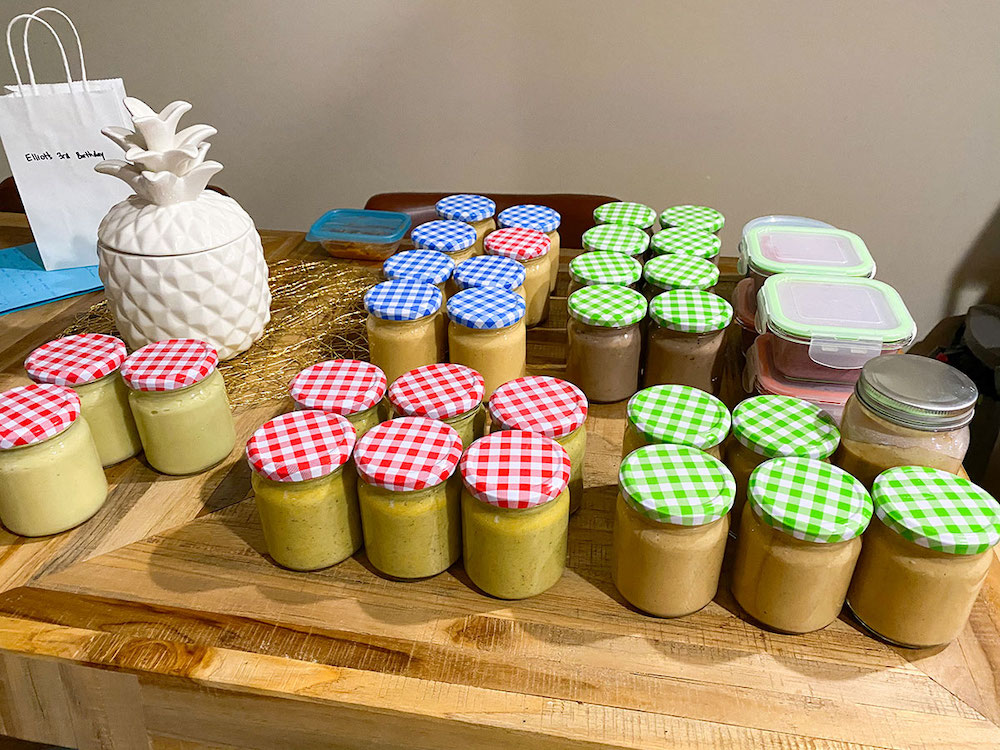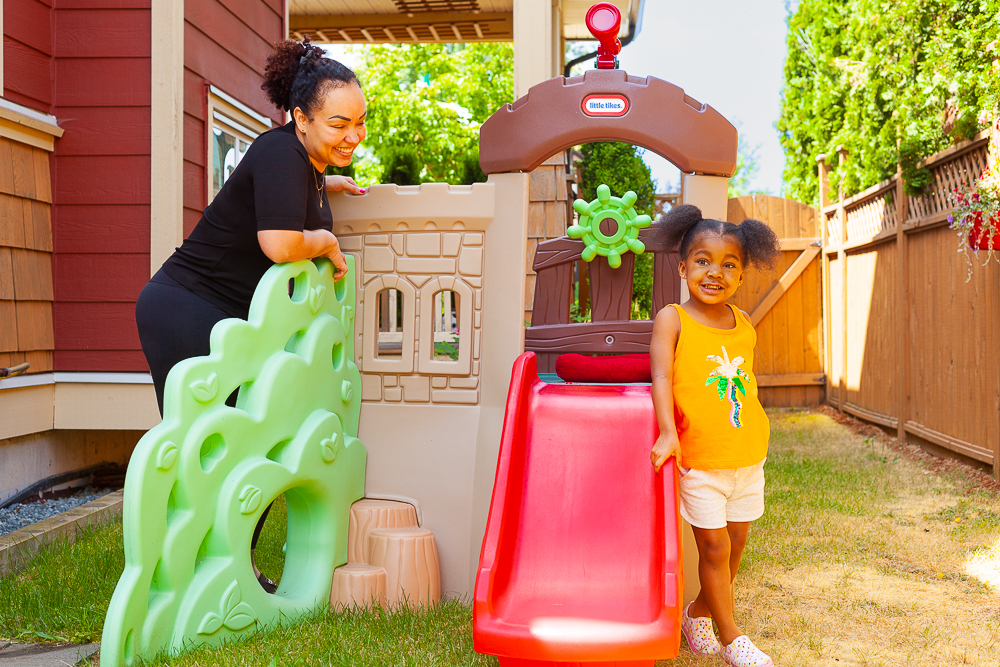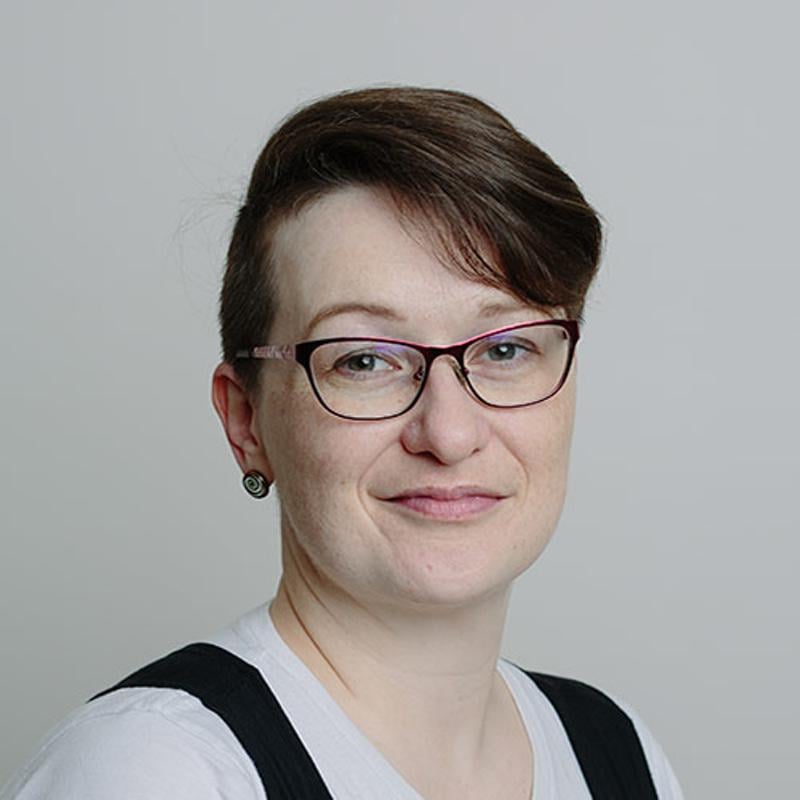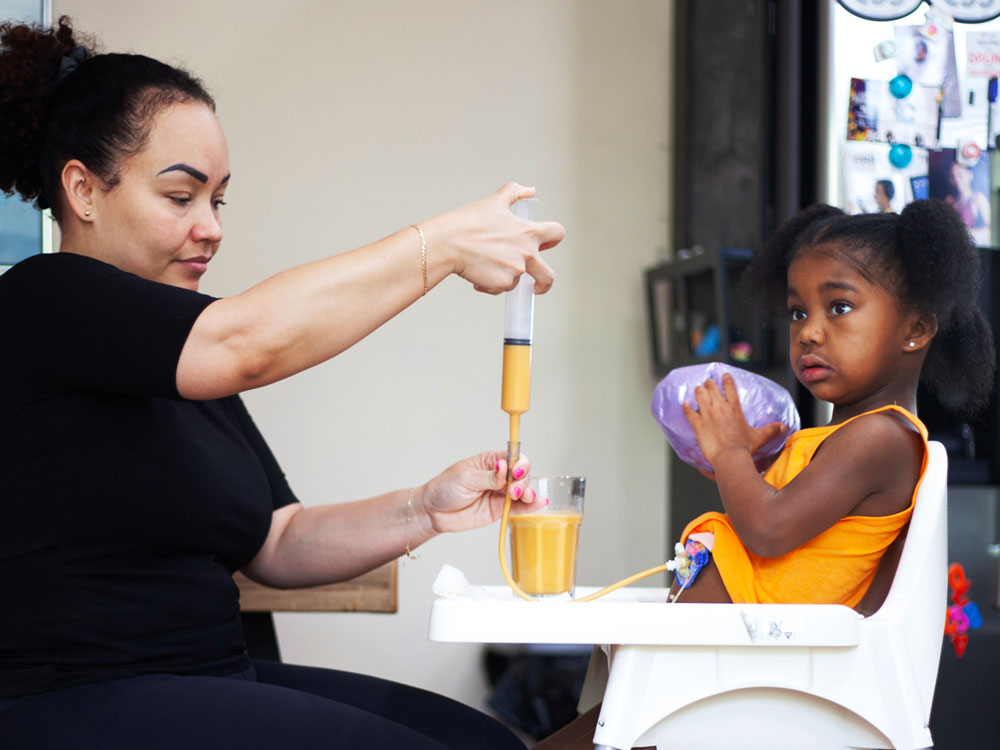Brooke Miller has been attending daycare at the Centre for Child Development in Surrey as often as possible for nearly four years. But she has never eaten a full meal there.
Brooke, who is five years old, has autism, a malformed cerebellum known as cerebellum dysplasia and Coffin-Siris syndrome-ARID1B, a gene mutation that impacts her physical and intellectual development. She is non-verbal.
She has had trouble eating since she was born, says her mom, Inger Miller.
“The child does not respond to milk in her mouth,” Miller recalls telling doctors when Brooke was an infant. “She doesn't know how to swallow.”
In her short life, Brooke has undergone many medical treatments to help her eat, including removing her tonsils and her adenoids in hopes it would help her keep food down.
In June 2020, a year after starting daycare at the Centre for Child Development, Brooke had surgery to install a gastrointestinal tube, or g-tube, when it became clear she wasn’t able to meet her nutritional needs through oral feeding.
Miller received training from a nurse at BC Children’s Hospital immediately following Brooke’s surgery, enabling her to use and clean her daughter’s gastrointestinal tube. She trained herself on changing the mic-key, the valve inserted into her daughter’s stomach that must be changed every three months, by following tutorials on YouTube.

G-tube feed training is not part of training for most early childhood educators.
And it’s not something Miller can provide training on herself — the Centre for Child Development is accredited by CARF Canada, short for the Commission on Accreditation of Rehabilitation Facilities, which requires that early childhood educators be trained by medical professionals on tasks such as g-tube feeding.
The hitch is that Nursing Support Services, a Ministry of Health program for assisting medically complex children in attending school, including training school staff, stopped working in child-care centres in 2016.
Though Miller has been able to get outside help to train staff about how to support Brooke to eat orally, she’s still only consuming the equivalent of three ice cubes worth of smoothie during her time at the centre, because her nutritional needs can’t be met by oral feeds alone.
And Miller’s request to bring outside feeding therapists to train staff on g-tube feeding or to feed Brooke via g-tube themselves have been rejected.
This meant Brooke is unable to receive g-tube feedings at preschool unless her parents, who both work full time, come every day at meal time and do it themselves.
Erika Cedillo, director of public policy and programs with Inclusion BC, says there are about 65 families in the province who require Nursing Support Services to send a nurse to attend a child-care setting with their child, while another 850 kids require nurse training from the program for child-care staff on delegated tasks like g-tube feeding.*
But most families are afraid that by speaking up about the lack of support will put the other public services and supports their kids do receive at risk, says Cedillo.
The decision to remove NSS from child-care settings was made in 2016, but disability groups like Inclusion BC and BC Complex Kids Society only became aware of the change in 2021. They were told the change was part of a process to ensure NSS practice aligned with its own program policies.
A similar issue occurred in 2022 when the program announced it would no longer deliver training to schools on life-saving seizure medication administration to children who hadn’t had a seizure in the last year. After parent outcry, the decision was reversed.
There has not been as swift a reaction to the lack of nursing support in child-care centres, sources told The Tyee, because depending on where you are and how long you have been receiving the service, NSS has allegedly made exceptions.
“I've been told that two children recently in the past several years since NSS has said that they do not allow this, have had training at the centre,” Miller said.
Because Brooke is Black and the children who received the exceptions are white, her mother wondered if this was racism.
Both Cedillo at Inclusion BC and Brenda Lenahan with BC Complex Kids Society say families they work with tell them that Nursing Support Services’ co-ordinators provide support in child-care settings in some health regions, while co-ordinators in other regions follow the policy that prevents this.
This unequal access to child-care centres for families of kids with complex medical issues is discrimination, says Cedillo. But so far no government ministry, health care authority or child-care centre is stepping up to address the problem.
“So we have a gap in the policies and the practice. And the effect of that is the exclusion of a child,” she said.
The Tyee asked the Health Ministry if they were aware of instances where nurses with the program were still working in child-care centres in the province.
“The decision to delegate is determined on a case-by-case basis for rare and exceptional circumstances at the sole discretion of the delegating nurse. If nurses assist in situations outside of the school context, it is out of a desire to help but is not within the scope of their assigned work,” read an emailed statement from a ministry spokesperson.
‘Should she look worse? Is that when you would be concerned?’
Miller sends Brooke to the centre with food provided through At-Home, a Children and Family Development Ministry program supporting families of kids with complex health issues. They provide Brooke with both oral and g-tube nutritional supplements and formulas.
While their gastrointestinal tube formulas have dairy free options, Miller has found almost all the oral foods and formulas provided contain dairy. Brooke does not respond well to dairy, her mother says.
“It leads to explosive diarrhea,” Miller said. “And a lot of vomit everywhere. And then she's lethargic, and she can't do therapies, which leads to regressions.”
The Tyee contacted the Ministry of Children and Family Development about dairy-free options for oral feeds through the At-Home program. A spokesperson responded by email that dairy-free options are available at the request of a child’s health-care professional.
But Miller says every “dairy-free” option the ministry has provided lists milk products in the ingredients. Except for Compleat 1.5 and Compleat Organic Blends, which Brooke refuses to drink because she doesn’t like the taste — though she will consume it through her g-tube, Miller said.

Centre for Child Development staff have recommended Miller send Brooke there with Pedialyte, a fluid meant to replenish electrolytes, sugars and minerals for dehydrated children, since she struggles to eat.
“The director at the centre’s daycare said she's doing well for weight, and so it's fine for her to just have Pedialyte during the day,” said Miller.
But she’s only doing fine for weight, says Miller, because Miller purchased a commercial-grade blender to create her own dairy-free g-tube formulas for Brooke at home.
“On Sunday I spend hours with working out calories, weighing foods, with tons of pots going to try to bulk her up. So she's only getting a meal in the morning and then several meals in the evening, because she can't eat anything during the day,” Miller said.
“So yeah, she looks well, but my thing is, ‘Oh, should she look worse? Is that when you would be concerned?’”
Brooke has access to a speech language pathologist, a physical therapist and an occupational therapist through the centre, though Miller says they only see Brooke every couple of months.
Until recently an outside behavioural consultant would work with Brooke at home to help her surpass the doctors' initial expectations for her, like being able to walk up stairs on her own.
But when Brooke gets sick — whether from a bug she picked up at daycare, from consuming dairy products, or because she’s recovering from a surgical procedure — she has to stay home from daycare and those skills she worked so hard to gain, like walking up and down stairs, can easily disappear.
“Nobody knows what that feels like for Brooke. She can't tell us it hurts,” Miller said. “Sometimes even before she vomits, she'll groan and she'll hold her head. And she's looking at me: this is heart-wrenching.”
Last fall Brooke was out of preschool for two weeks because of vomiting and diarrhea. While Miller’s work has flexibility like working from home and making her own hours, the lack of child care adds to her stress, which has led to her own poor health like a prolonged bout of bronchitis last fall.
“Brooke doesn't just vomit: she loses full control of her body, you have to hold her head up, or she slams her head,” Miller said.
“When Brooke is sick, in between meetings I'm running up and downstairs. I've actually been in virtual meetings and I have poop and vomit on my clothes.”
Miller, who works out every morning at 5 a.m. in order to have the strength to carry Brooke when she can’t walk, is concerned there will be a day when her daughter is too big to catch or Miller isn’t fast enough and Brooke hits her head during a fall.
“Then I'm going to be in the ER and someone's gonna say 'Well, were you watching her?' Hell yeah I was. But maybe I'm not strong enough to hold her at that point,” Miller said.
“I try my best to meet all of these different needs. But it is insanity.”
Violating a child’s right to child care
Brooke, who lives full time with her mom and two teenage siblings, has support from her dad, but he also works full time. This leaves Miller, who immigrated to Canada from the Bahamas in 2016, with no other family support for Brooke or her expenses.
Families of children with medical complexities often have higher expenses than other families, Lenahan of BC Complex Kids Society said. But without appropriate child care, parents have trouble maintaining a job.
It’s typically women, she added, who end up staying home as full-time caregivers in the absence of supportive child care.
“It's a lifelong impact because it impacts your career, how you save for your child's future, which they are going to need care generally, in our demographic, for a long time. And you need to be financially prepared for that,” she said.
“And it starts early, in that child-care zone. It's financially devastating, and it's socially devastating as well. It's a key piece that needs to be done well in order for everything else to work.”

Access to child care isn’t just about parents’ ability to work. It also benefits children to interact with their peers, learn how to socialize, and physically and mentally develop before they start school.
“One of the key ways of learning things is what they call modelling, which means she needs to see another child do it,” Miller said.
“And she needs to see it enough times for that to sink in, like, ‘Oh, this is how you put a jacket on.’ All of that is therapy for her. She needs those social skills.”
By not providing supports required to attend child care, the province is discriminating against children with complex medical needs and their families, Cedillo of Inclusion BC says.
“We are first of all violating their rights. But then we're limiting their possibilities and limiting the opportunities for growth,” she said.
The ministry’s response
The Tyee contacted the Centre for Child Development in Surrey for their response to Miller’s statements, but after an initial email acknowledging our request last December, centre staff stopped responding to our request.
We also requested an interview with Minister of State for Childcare Grace Lore. But because Nursing Support Services is under the Health Ministry, we were directed to their communications staff, who sent an email stating they couldn’t comment on Brooke’s situation, but they were working with her family.
The Tyee followed up with a detailed list of questions for the Health Ministry, including asking why NSS support was removed from child-care spaces in 2016, and if the support would be returned, or provided by another service.
The ministry responded with an emailed statement acknowledging there was more they could do to support children with complex medical conditions.
“We want to assure parents and guardians that we hear their concerns and that the ministries of health, education and child care, children and family development are working collaboratively to determine how to better support the inclusion of children with complex medical needs in child-care settings,” it read in part.
The ministry did not say why NSS support had been removed from child-care spaces, but they note the delegation of tasks by a nurse is different from school staff being trained by a nurse.
“Delegations are enacted on a case-by-case basis and several factors; including the complexity of care, skill required and environment, must be considered for a nurse to determine if they can safely delegate care,” the ministry statement reads.
“Nurses hold the overall accountability and responsibility for each delegation they enact under their professional practising license and are responsible for the ongoing monitoring and supervision of each delegation they enact.”
They added parents have been informed of the lack of NSS support in daycare settings and what supports are available “on a case-by-case basis.” Parents are the experts on their children, they added, and could perhaps train child-care staff themselves in tasks like g-tube feeding.
Which is what Miller said she offered to do, but the centre rejected g-tube training coming from anywhere but a medical professional.
Put nurses back in daycares
Last month the BC Green Party put out a press release calling on the provincial government to expand the Nursing Support Services program overall, after hearing from families who were not receiving the nursing hours their child had been approved for from the program.
The release came from the party’s deputy leader, Sanjiv Gandhi, a former paediatric cardiothoracic surgeon. In an interview with The Tyee earlier this month, Gandhi said he was unaware children in B.C. were having issues accessing child care because of a lack of NSS support.
“It’s also news to me that the hospital wouldn’t do that [training],” Gandhi said, referring to BC Children’s Hospital. “They often would, upon discharge, arrange for people from the child-care facility to come to the hospital to get trained rather than sending nurses there, because it’s not a complex thing to do so.”
Miller said BC Children’s did not offer to train staff at the centre, and when she asked hospital staff if they would provide the early childhood educators with g-tube training, they said no.
Because the population of kids with medical complexities is a small one compared to, for example, people diagnosed with cancer in the province, Gandhi said, “unfortunately decisions are often made on factors that encompass politics more than people.”
Gandhi, who worked with many medically complex kids in his time as a surgeon, echoed many of the statements Cedillo and Lenahan made about the impacts of stress put on families when they can’t access services for their disabled kids.
“A sick kid is a sick family,” he said. “If you have a parent who has to be off work because they’re caring for a kid, those lost work hours carry a huge impact.”
Cedillo and Lenahan believe the solution to the problem is to change NSS policy to allow nurses to work in child-care settings again.
Or, if that is not possible, allow community nurses to do the same work with medically complex kids that Nursing Support Services used to do.
“We know that in practice, some community nurses are doing that,” Cedillo said, adding it is a “quick fix.”
They would also like to see a review of Nursing Support Services, including comprehensive and inclusive consultation with the families who use the service, the disability organizations who advocate on their behalf and every ministry that provides services for kids with complex medical conditions.
“Our vision is of a program that would allow the support for families to be able to work, to have a break, to have community inclusion, and support for the mental health and medical health needs of the children and the parents,” Cedillo said.
Gandhi agrees with the call for a complete overhaul of the program. “Right now there’s a big disconnect between what’s being provided and what’s necessary, and there’s almost zero traction that [BC Parents of Complex Kids] is getting with the Ministry of Health,” he said.

While Miller doesn’t feel like Brooke is developmentally ready, she plans to enrol her in kindergarten this fall because schools are covered by Nursing Support Services. She is also trying to enrol her daughter in an after-school program that she hopes will allow Miller to train staff on using the g-tube.
“This would make a huge difference for Brooke if she can have feeds at school and feeds after school before coming home,” Miller said.
“We can finally just be a regular family.”
* Story updated on June 29 at 4:24 p.m. to correct how many families and kids require child-care assistance from Nursing Support Services in the province. ![]()
Read more: Health, Rights + Justice

















Tyee Commenting Guidelines
Comments that violate guidelines risk being deleted, and violations may result in a temporary or permanent user ban. Maintain the spirit of good conversation to stay in the discussion and be patient with moderators. Comments are reviewed regularly but not in real time.
Do:
Do not: